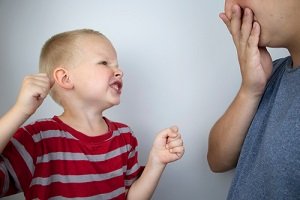Researchers call it “parenting by lying” — making verbal statements to children with an intent to deceive and influence influence them (Setoh et al 2024). Studies suggest that the vast majority of parents engage in this behavior at least sometimes. So is it harmful? What happens when adults lie to children? The evidence suggests that kids may become more dishonest with us, and not only that: When we make a practice of telling children lies, kids may be at a higher risk of developing aggressive and antisocial behavior problems.

How do we know? What makes lying so “contagious”? And what can we do to stop it? Let’s take a closer look at the research.
Blatant lying 101: The quick and easy way to increase dishonesty in children
How can we test the effects of adult lies on children’s behavior? Researchers have worked out an experimental method, and it works like this.
Phase one: Tell a lie
A friendly but unfamiliar adult meets a child, and says, “There is a huge bowl of candy in the next room. Want to go get some?”
The child agrees, and follows the adult into the room. But there is no candy. The adult admits it was a lie, explaining, “I just said that because I wanted you to come play with me.”
How do the kids react to this? When Chelsea Hays and Leslie Carver conducted this type of experiment on 46 children, they noticed that — as you might expect — children felt disappointed. But the children were polite, and they agreed to play with the adult anyway. And this leads to the next part of the experiment.
Phase two: A guessing game
Now the adult asks the child to stare straight ahead while the adult holds a toy behind the child’s back. In the experiment conducted by Hays and Carver, the toy represented a familiar children’s fictional character (like Winnie the Pooh, or the Cookie Monster).
This is a guessing game, the child is told. Try to guess the identity of the toy without looking.
After playing two rounds of the game, the adult suddenly explaines that she must leave for a minute to take a phone call. She says she’ll be right back, after which they will continue the game.
And meanwhile, the adult explains, she is going to leave behind the next toy to be identified. She covers it — so the child can’t see what it was — and puts it on a table.
“Don’t peek while I’m gone!”
Phase three: The adult leaves, then comes back…what do kids do?


In the expermient by Hays and Carver, the adult was gone for 90 seconds, during which time the child’s activities were recorded by a hidden camera.
When the adult returned, she asked the child to promise to tell the truth. Then she asked the child, “When I was gone did you turn around and peek to look at the toy?”
So this was the moment of truth. If kids had taken a peek, would they lie about it now? Hays and Carver recorded the answers, and compared the results to those of children in a control group — 47 kids who went through the same procedure, but without the initial trickery. They hadn’t been lied to.
Did prior experience with adult lying make a difference in children’s behavior?
Did kids react differently depending on whether or not they’d previously caught the adult in a lie?
The answer – for the youngest kids – was no. Compared with older children, 3- and 4-year-olds tended to peek more often. They also tended to tell the truth more often. But their responses didn’t vary by condition. Being lied to did not make a difference.
By contrast, the behavior of older kids (ages 5 and up) depended on the adult’s track record with honesty. The kids who’d been tricked by the adult were more likely to peek. They were also more likely to lie about it afterwards.
Why weren’t the youngest children affected?
Maybe the preschoolers in this experiment were simply too young to understand how lying works. As I note elsewhere, research suggests that young children lack the cognitive skills to fully grasp the concept of lying. Another possibility: Maybe the youngest children were more forgiving (Hays and Carver 2014).
But either way, the experiment provides us with evidence that older kids – children aged 5 and up – changed their behavior. And we should consider. This experiment concerned only very short-term effects — a child’s immediate reaction to a single act of lying.
So in the real world, what counts as “parenting by lying”?
Researchers offer these examples.
Lies that parents tell in order to achieve compliance
According to Peipei Setoh and her colleagues, these types of lies typically take two forms — false threats and false promises.
False threats include warnings like, “If you continue to mistreat your sister, I will call the police to put you in jail,” whereas false promises include bad faith attempts at bribery, like “If you finish your homework, I’ll take you to Disneyland” (Setoh et al 2024).
Lies that parents tell in order to influence a child’s feelings
These types of lies include well-intentioned falsehoods that are supposed to make children feel happy and confident — like false praise. They also include endorsements of imaginary creatures that the parent doesn’t actually believe in (like the Tooth Fairy).
Who engages in parenting by lying?
As noted in the introduction, it’s very prevalent. Surveys of parents suggest that around 78% of American parents do it. In China, the percentage may be as high as 90% (Setoh et al 2024).
What happens when kids are raised in an environment where adults routinely use lies to control and manipulate?


The best way to answer this question scientifically would be to conduct long-term experiments. But that would be extremely unethical. Randomly assigning some kids to be raised by adults who lie to them on a regular basis? We can’t do that.
So we’re left with another approach: Measure lying in the real world, and look for correlations.
What does this approach tell us about the possible impact on children?
Unfortunately, I haven’t yet found any studies published in peer-reviewed journals. But the preliminary research is suggestive.
For example, in research for her doctoral dissertation, Rachel Marie Jackson (formerly Santos), measured the lying propensities of Canadian children (ages 6-12) in the laboratory, and then compared this with their parents’ self-confessed rates of “parenting by lying.” The kids who were exposed to higher levels of parental lying tended were more likely to tell lies themselves (Jackson 2021).
Similarly, in a conference presentation of research on 11- and 12-year-olds in Singapore, researchers reported links between children’s behavior and exposure to “parenting by lying.” Exposed children were more likely to tell lies to their own parents, and more likely to experience problems with psychological adjustment (Low et al 2023)
Is it possible that negative effects of “parenting by lying” extend into adulthood?
If you grow up with a parent who routinely lies to you, are you more likely to engage in dishonesty yourself as an adult? Rachel Santos and her colleagues tried this approach with a couple of studies.
In one study, they interviewed 50 female college undergraduates at a North American university (Santos et al 2017). In the other, they questioned 179 young adults living in Singapore (Setoh et al 2020). And in both cases, the researchers asked people to reflect on their childhoods, and to recollect whether or not their parents had been in the habit of telling them lies.
In particular, the researchers asked about four categories of falsehoods:
- lies related to eating ( e.g., “you need to finish all your food or you will get pimples all over your face,”)
- lies related to leaving or staying ( e.g.,”if you don’t come with me now, I will leave you here by yourself,”)
- lies related to money (e.g., “I did not bring money with me today, we can come back another day,”) and
- lies related to misbehavior (e.g., “if you do not behave, I will call the police”).
These are called “instrumental lies,” and they are pretty common.
In a survey of parents in the United States and China, almost half the American participants reported telling their kids instrumental lies related to misbehavior, and a majority of parents in both countries reported telling at least one lie from each of the other three categories (Heyman et al 2013).
But some parents lie more than others. Does this have an impact on the way kids behave when they reach young adulthood? To find out, Santos and her colleagues also asked study participants about their own, current behavior patterns. And there were links.
Young adults who remembered greater exposure to “parenting by lying” were more likely to report “lying to their parents more frequently in adulthood” (Santos et al 2017).
They also showed higher levels of psychological maladjustment. They were more likely to suffer from aggressive behavior problems and antisocial personality problems (Santos et al 2017; Setoh et al 2020).
Of course, these are correlations only. They don’t prove that parental lying causes — or contributes to — the development of dishonesty and psychological maladjustment. But the results are consistent with this interpretation. They’re also consistent with some of the short-term effects observed in the “I’ve got a huge bowl of candy” experiment.
And the results jibe other research about social networks. People are more likely to tell lies when they perceive that other people in their world — friends, family, romantic partners — make a habit of stretching the truth (Mann et al 2014).
Moreover, the whole “dishonesty-breeds-dishonesty” pattern makes sense, especially if you consider things from the perspective of game theory.
In particular, the outcomes of these studies remind me of research on the Prisoner’s Dilemma, a classic strategic scenario. If you haven’t heard of it before — or you need a reminder about the details — here’s a version of the puzzle for you to review.
The Prisoner’s Dilemma: Should you trust your partner, or look out for yourself?
Imagine that you are accused of having committed crimes with an accomplice. Both you and the other person have been arrested by the police. Your accomplice is being held in a separate cell, and the two of you can’t communicate.
The prosecutors need a confession to ensure they get a conviction on the most serious charges. So they offer you a deal:
“If you confess and your accomplice remains silent, we will let you go free, and your accomplice will spend 20 years in jail.”
That’s good for you, right? But there’s a problem. They also tell you this:
“If both of you confess, then you’ll each get 15 years in prison.”
So maybe you should stay silent. Except remaining silent comes with its own risks:
“If you stay silent and your accomplice confesses, then your accomplice will go free, and you’ll be the one to serve the 20-year sentence.”
Uh-oh. That’s not good. And if both of you stay silent?
“If neither of you confesses, we’ll convict you both on the lesser charges, and you will both serve a sentence of two months.”
You can see why the Prisoner’s Dilemma is troublesome. To make a choice that will minimize prison time, you need to know what the other guy is going to do.
If the two of you could talk privately — and trust each other — you could strike a deal. You could agree to stay silent. You’d each pay a small penalty — serve a sentence of two months. But you would both avoid spending 20 years in prison.
But unfortunately you can’t have this private conference, and you have to worry about being double-crossed. And that might inspire both of you to confess — in which case you both end up serving 15 years!
So what does this have to do with honesty and parenting?


You might never find yourself facing prison time. But the underlying dilemma – to cooperate or defect – comes up all the time in daily life.
We frequently encounter situations in which we’d prefer to cooperate. It doesn’t always lead to the options that maximize our immediate, selfish interests. But it usually serves us pretty well. And it comes with long-term payoffs: It helps us build supportive social networks. We can look forward to the future knowing that somebody else has got our back.
But there’s a hitch, a problem with cooperating. What if we can’t trust the other guy?
And that’s where the Prisoner’s Dilemma relates to “parenting by lying.” Kids have to decide whether or not to trust us.
The parent is like the accomplice in the Prisoner’s Dilemma – the person the child is trying to second-guess. If kids know we’ve lied to them in the past, they must decide if we’re worth cooperating with now.
Should kids take that chance? Or should they abandon cooperation, and look out for themselves?
Game theorists have studied these situations, and suggested that one strategy is pretty effective, at least when we play the game repetitively with the same individual. It’s called “tit-for-tat,” and it’s pretty simple:
The “tit for tat” strategy
1. Begin the first game by choosing to cooperate.
2. If your partner makes the same choice, hooray! You’ve got reason to trust. When the game is repeated, cooperate again, and continue in this way as long as your partner keeps cooperating.
3. But the moment your partner defects, do the same. He abandoned you, and can’t be trusted any longer.
Do children respond to parental lying by playing tit-for-tat?
If so, we’re in trouble! The first time they catch us out in a self-serving, manipulative lie, they may decide to respond in kind.
But there is evidence that intelligent, social creatures – like humans and chimpanzees – don’t play tit-for-tat in this unforgiving way (Jaeggi et al 2013).
Instead, individuals act as if it’s the long-term trend that counts. If your partner has a good track record of being helpful and trustworthy, you may be willing to overlook the occasional defection or broken promise.
And that’s hopeful news. If you’re guilty of “parenting by lying,” you needn’t assume that you’ve blown it. Keep lying to a minimum — establish a good track record — and it’s likely you’ll build up a reservoir of trust.
But the research does hold up a warning sign.
When we lie to kids, they may view this as the green light to lie back. And if we don’t take steps to repair the trust, we might pay long-term costs.
What about the links with aggression, and with antisocial personality problems?
Why would parental lying fuel these troubles?


The Prisoner’s Dilemma might help explain why kids tell lies to dishonest adults. But what about the other, long-term outcomes observed by Rachel Santos and her colleagues? The increased aggression? The higher risk of developing anti-social personality problems?
We can’t know for sure. But the researchers speculate that “parenting by lying” tends to displace other, more constructive methods of shaping behavior.
Parents who rely heavily on instrumental lies may spend less time less time engaging their kids in conversations that could help them develop crucial problem-solving and negotiation skills.
As a result, their kids grow up with fewer such skills, putting them at higher risk for anti-social behavior (Santos et al 2017).
It’s speculation, but it sounds reasonable. And it points to another hopeful point:
We can steer kids away from aggression and antisocial behavior by coaching them in how to handle their emotions and impulses.
For tips, see my article on emotion coaching, as well as this Parenting Science guide to positive parenting tactics.
So where does this all lead us? To a very anti-authoritarian conclusion
Our kids are better off if adults avoid telling them manipulative lies.
When kids become aware of our lies, it affects their behavior — both in the short-term, and the long-term.
And it probably harms our relationships, too. In yet another study of outcomes among young adults, people who remembered frequent parental lying during childhood were much more likely to say they were dissatisfied with the relationship they had with their parents (Cargill and Curtis 2017).
So if we want to inspire honest behavior in our children, we need to model honest behavior with them.
If we want to raise kids who are well-adjusted and ready to treat others with respect, we need to avoid manipulating them with lies.
If we want our personal relationships to feel mutually rewarding, we need to treat each other with honesty and kindness.
It isn’t, as they say, rocket science. But it requires effort and vigilance. Are we ready to take up the challenge?
More information about parenting and the development of lying
“Parenting by lying” isn’t the only way adults influence children’s honesty.
Research also suggests that punitive discipline encourages kids to lie. And kids may feel justified in lying if they perceive an adult’s authority to be illegitimate. When parents become overly intrusive — or try to impose rules that kids perceive to be unjust or unreasonable — they are more likely to rebel.
To read more about these phenomena, see my articles,
In addition, you can read more about the fascinating development of lying in my article, “At what age do children begin telling lies?”
And what about the sorts of lies that aren’t antisocial? The types of lies that people tell to be nice to each other? Kids understand these too. For more information, see my article, “Compassionate deception: Do children tell lies to be kind?“
References: When adults lie to children
Cargill JR and Curtis DA. 2017. Parental Deception: Perceived Effects on Parent-Child Relationships. Journal of Relationships Research 8: e1.
Hays C and Carver LJ. 2014. Follow the liar: the effects of adult lies on children’s honesty. Dev Sci. 17(6):977-83.
Heyman GD, Hsu AS, Fu G, Lee K. 2013. Instrumental lying by parents in the US and China. Int J Psychol. 48(6):1176-84.
Heyman GD, Luu DH, Lee K. 2009. Parenting by lying. J Moral Educ. 38(3):353-369.
Jackson R. 2021. Exploring the associations of parenting by lying with psychosocial adjustment, dishonesty, and culture. University of Toronto.
Low PHX, Lee K, Meaney MJ, and Setoh P. (2023, March 24). Parenting by lying and its correlates of psychosocial outcomes in Singaporean children [Paper presentation]. Society for Research in Child Development 2023 Biennial Meeting, Salt Lake City, Utah, United States.
Mann H, Garcia-Rada X, Houser D, Ariely D. 2014. Everybody else is doing it: exploring social transmission of lying behavior. PLoS One. 9(10):e109591
Nguyen SP, Gordon CL, Chevalier T, Girgis H. 2016. Trust and doubt: An examination of children’s decision to believe what they are told about food. J Exp Child Psychol.144:66-83.
Santos RM, Zanette S, Kwok SM, Heyman GD, and Lee K. 2017. Exposure to Parenting by Lying in Childhood: Associations with Negative Outcomes in Adulthood. Front Psychol. 2017 8:1240.
Setoh P, Low PHX, Heyman GD, Lee K. 2024. Parenting by Lying. Curr Dir Psychol Sci. 33(1):51-57.
Setoh P, Zhao S, Santos R, Heyman GD, Lee K. 2020. Parenting by lying in childhood is associated with negative developmental outcomes in adulthood. J Exp Child Psychol. 189:104680.
Vanderbilt KE, Heyman GD, Liu D. 2014. In the absence of conflicting testimony young children trust inaccurate informants. Dev Sci. 17(3):443-51.
Text © 2018 – 2021 Gwen Dewar, Ph.D., all rights reserved
image of girl in orange shirt with raised eyebrow by istock / TatyanaGl
image of peaking child by TY Lim / shutterstock
image of grumpy kids in a line-up by Gelpi / shutterstock
close-up of girl talking to adult by pixelheadvideo digitalskillet / shutterstock
aggressive boy by Alona Siniehina / shutterstock
content last modified 11/2024. Portions of the text are derived from an earlier version of this article, written by the same author.